Assessing HRM and Cultural Factors: UK Call Centre in Japan
VerifiedAdded on 2023/06/17
|10
|3154
|140
Report
AI Summary
This report critically evaluates the cultural and HRM issues faced by a UK business when establishing a call center in Japan. It discusses the impact of culture on managerial decision-making, particularly in the context of international human resource management, referencing Hofstede's framework to understand cultural differences. The report also examines the management of people as a business resource integral to international organizational strategies, considering various strategies such as global, multi-domestic, transnational, and international approaches. The analysis highlights the challenges of adapting to Japanese cultural norms, including language barriers, body language nuances, and differing communication styles, and the importance of workforce diversity and cultural sensitivity for successful international operations. Desklib provides a platform for students to access similar solved assignments and study resources.
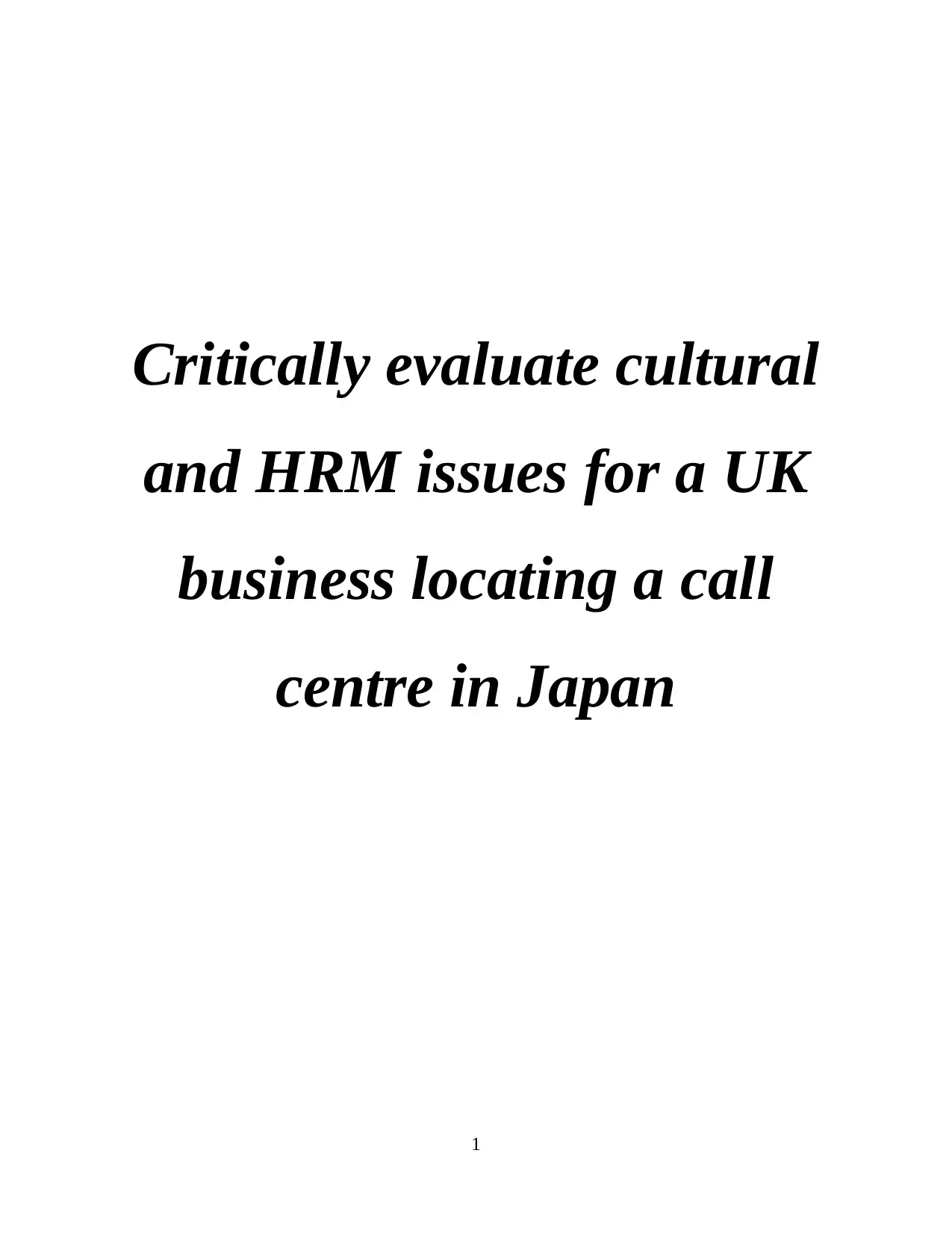
Critically evaluate cultural
and HRM issues for a UK
business locating a call
centre in Japan
1
and HRM issues for a UK
business locating a call
centre in Japan
1
Paraphrase This Document
Need a fresh take? Get an instant paraphrase of this document with our AI Paraphraser
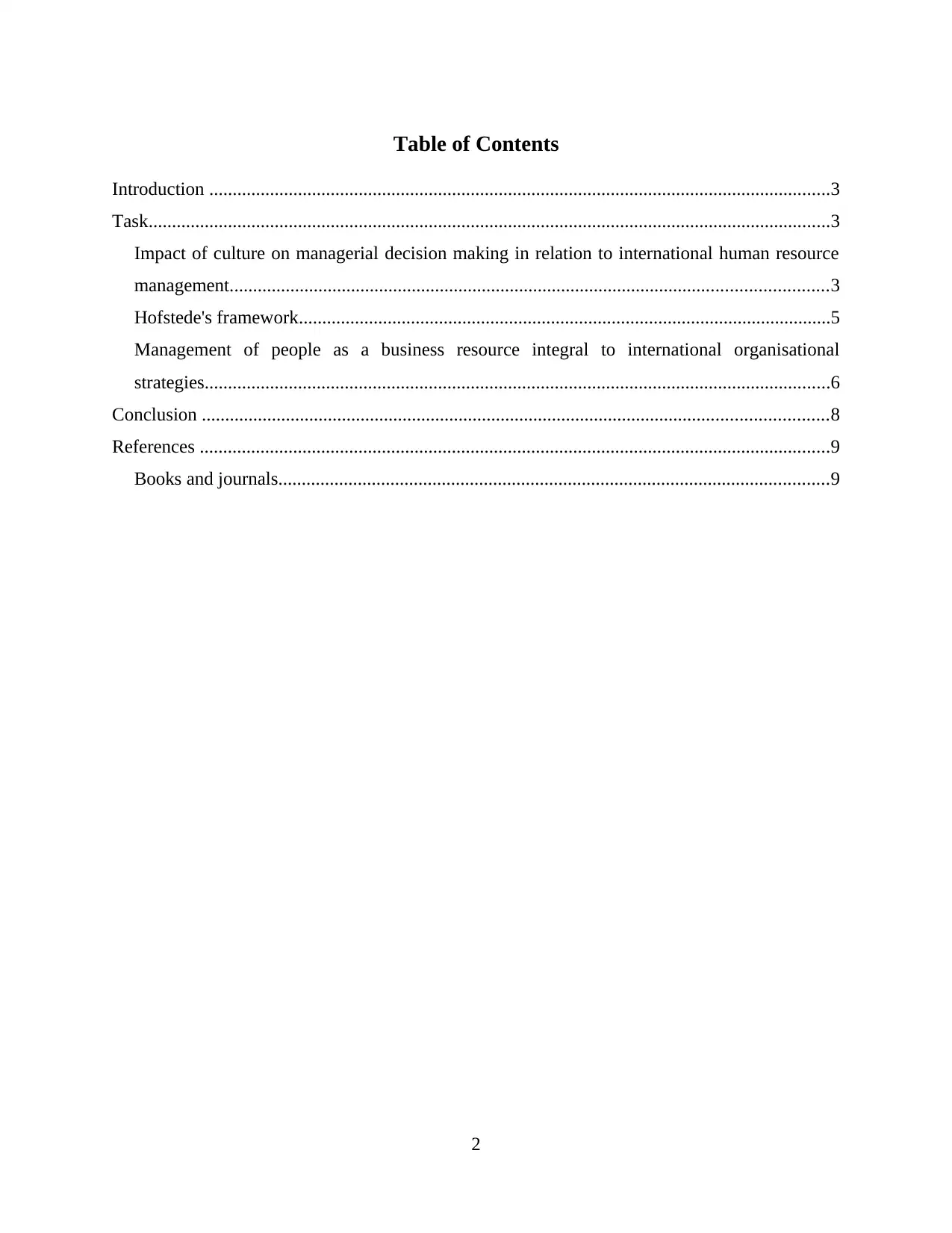
Table of Contents
Introduction .....................................................................................................................................3
Task..................................................................................................................................................3
Impact of culture on managerial decision making in relation to international human resource
management................................................................................................................................3
Hofstede's framework..................................................................................................................5
Management of people as a business resource integral to international organisational
strategies......................................................................................................................................6
Conclusion ......................................................................................................................................8
References .......................................................................................................................................9
Books and journals......................................................................................................................9
2
Introduction .....................................................................................................................................3
Task..................................................................................................................................................3
Impact of culture on managerial decision making in relation to international human resource
management................................................................................................................................3
Hofstede's framework..................................................................................................................5
Management of people as a business resource integral to international organisational
strategies......................................................................................................................................6
Conclusion ......................................................................................................................................8
References .......................................................................................................................................9
Books and journals......................................................................................................................9
2
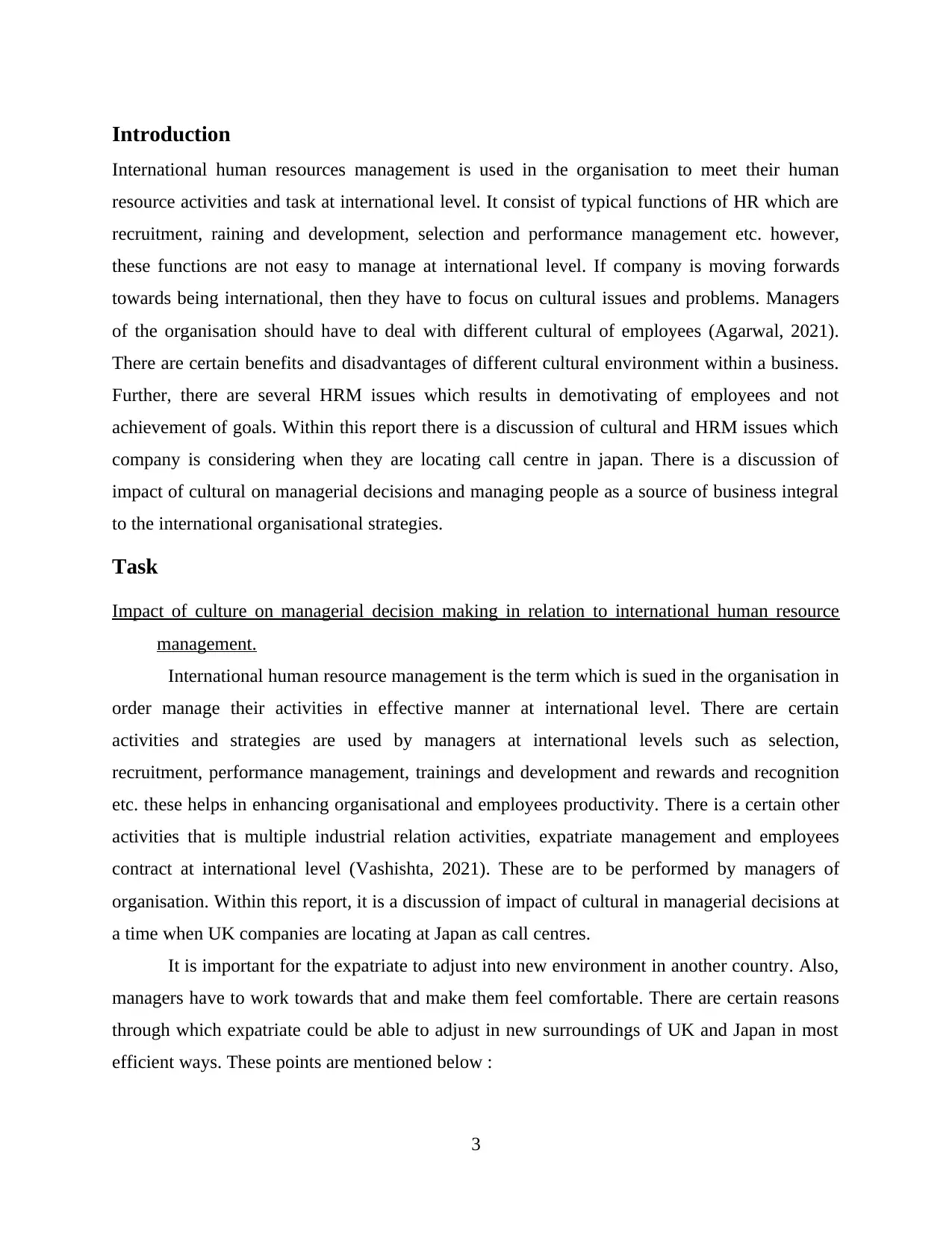
Introduction
International human resources management is used in the organisation to meet their human
resource activities and task at international level. It consist of typical functions of HR which are
recruitment, raining and development, selection and performance management etc. however,
these functions are not easy to manage at international level. If company is moving forwards
towards being international, then they have to focus on cultural issues and problems. Managers
of the organisation should have to deal with different cultural of employees (Agarwal, 2021).
There are certain benefits and disadvantages of different cultural environment within a business.
Further, there are several HRM issues which results in demotivating of employees and not
achievement of goals. Within this report there is a discussion of cultural and HRM issues which
company is considering when they are locating call centre in japan. There is a discussion of
impact of cultural on managerial decisions and managing people as a source of business integral
to the international organisational strategies.
Task
Impact of culture on managerial decision making in relation to international human resource
management.
International human resource management is the term which is sued in the organisation in
order manage their activities in effective manner at international level. There are certain
activities and strategies are used by managers at international levels such as selection,
recruitment, performance management, trainings and development and rewards and recognition
etc. these helps in enhancing organisational and employees productivity. There is a certain other
activities that is multiple industrial relation activities, expatriate management and employees
contract at international level (Vashishta, 2021). These are to be performed by managers of
organisation. Within this report, it is a discussion of impact of cultural in managerial decisions at
a time when UK companies are locating at Japan as call centres.
It is important for the expatriate to adjust into new environment in another country. Also,
managers have to work towards that and make them feel comfortable. There are certain reasons
through which expatriate could be able to adjust in new surroundings of UK and Japan in most
efficient ways. These points are mentioned below :
3
International human resources management is used in the organisation to meet their human
resource activities and task at international level. It consist of typical functions of HR which are
recruitment, raining and development, selection and performance management etc. however,
these functions are not easy to manage at international level. If company is moving forwards
towards being international, then they have to focus on cultural issues and problems. Managers
of the organisation should have to deal with different cultural of employees (Agarwal, 2021).
There are certain benefits and disadvantages of different cultural environment within a business.
Further, there are several HRM issues which results in demotivating of employees and not
achievement of goals. Within this report there is a discussion of cultural and HRM issues which
company is considering when they are locating call centre in japan. There is a discussion of
impact of cultural on managerial decisions and managing people as a source of business integral
to the international organisational strategies.
Task
Impact of culture on managerial decision making in relation to international human resource
management.
International human resource management is the term which is sued in the organisation in
order manage their activities in effective manner at international level. There are certain
activities and strategies are used by managers at international levels such as selection,
recruitment, performance management, trainings and development and rewards and recognition
etc. these helps in enhancing organisational and employees productivity. There is a certain other
activities that is multiple industrial relation activities, expatriate management and employees
contract at international level (Vashishta, 2021). These are to be performed by managers of
organisation. Within this report, it is a discussion of impact of cultural in managerial decisions at
a time when UK companies are locating at Japan as call centres.
It is important for the expatriate to adjust into new environment in another country. Also,
managers have to work towards that and make them feel comfortable. There are certain reasons
through which expatriate could be able to adjust in new surroundings of UK and Japan in most
efficient ways. These points are mentioned below :
3
⊘ This is a preview!⊘
Do you want full access?
Subscribe today to unlock all pages.

Trusted by 1+ million students worldwide
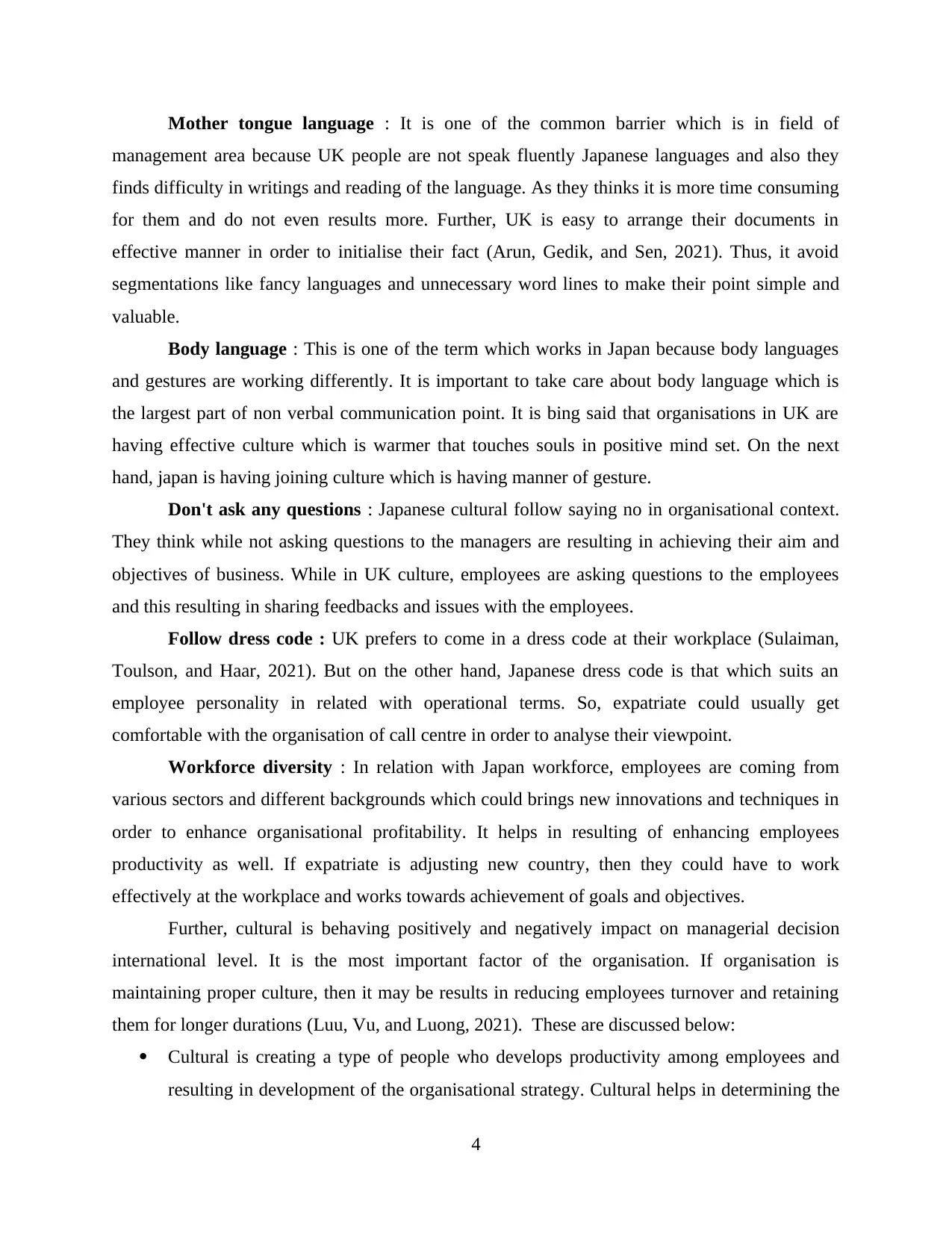
Mother tongue language : It is one of the common barrier which is in field of
management area because UK people are not speak fluently Japanese languages and also they
finds difficulty in writings and reading of the language. As they thinks it is more time consuming
for them and do not even results more. Further, UK is easy to arrange their documents in
effective manner in order to initialise their fact (Arun, Gedik, and Sen, 2021). Thus, it avoid
segmentations like fancy languages and unnecessary word lines to make their point simple and
valuable.
Body language : This is one of the term which works in Japan because body languages
and gestures are working differently. It is important to take care about body language which is
the largest part of non verbal communication point. It is bing said that organisations in UK are
having effective culture which is warmer that touches souls in positive mind set. On the next
hand, japan is having joining culture which is having manner of gesture.
Don't ask any questions : Japanese cultural follow saying no in organisational context.
They think while not asking questions to the managers are resulting in achieving their aim and
objectives of business. While in UK culture, employees are asking questions to the employees
and this resulting in sharing feedbacks and issues with the employees.
Follow dress code : UK prefers to come in a dress code at their workplace (Sulaiman,
Toulson, and Haar, 2021). But on the other hand, Japanese dress code is that which suits an
employee personality in related with operational terms. So, expatriate could usually get
comfortable with the organisation of call centre in order to analyse their viewpoint.
Workforce diversity : In relation with Japan workforce, employees are coming from
various sectors and different backgrounds which could brings new innovations and techniques in
order to enhance organisational profitability. It helps in resulting of enhancing employees
productivity as well. If expatriate is adjusting new country, then they could have to work
effectively at the workplace and works towards achievement of goals and objectives.
Further, cultural is behaving positively and negatively impact on managerial decision
international level. It is the most important factor of the organisation. If organisation is
maintaining proper culture, then it may be results in reducing employees turnover and retaining
them for longer durations (Luu, Vu, and Luong, 2021). These are discussed below:
Cultural is creating a type of people who develops productivity among employees and
resulting in development of the organisational strategy. Cultural helps in determining the
4
management area because UK people are not speak fluently Japanese languages and also they
finds difficulty in writings and reading of the language. As they thinks it is more time consuming
for them and do not even results more. Further, UK is easy to arrange their documents in
effective manner in order to initialise their fact (Arun, Gedik, and Sen, 2021). Thus, it avoid
segmentations like fancy languages and unnecessary word lines to make their point simple and
valuable.
Body language : This is one of the term which works in Japan because body languages
and gestures are working differently. It is important to take care about body language which is
the largest part of non verbal communication point. It is bing said that organisations in UK are
having effective culture which is warmer that touches souls in positive mind set. On the next
hand, japan is having joining culture which is having manner of gesture.
Don't ask any questions : Japanese cultural follow saying no in organisational context.
They think while not asking questions to the managers are resulting in achieving their aim and
objectives of business. While in UK culture, employees are asking questions to the employees
and this resulting in sharing feedbacks and issues with the employees.
Follow dress code : UK prefers to come in a dress code at their workplace (Sulaiman,
Toulson, and Haar, 2021). But on the other hand, Japanese dress code is that which suits an
employee personality in related with operational terms. So, expatriate could usually get
comfortable with the organisation of call centre in order to analyse their viewpoint.
Workforce diversity : In relation with Japan workforce, employees are coming from
various sectors and different backgrounds which could brings new innovations and techniques in
order to enhance organisational profitability. It helps in resulting of enhancing employees
productivity as well. If expatriate is adjusting new country, then they could have to work
effectively at the workplace and works towards achievement of goals and objectives.
Further, cultural is behaving positively and negatively impact on managerial decision
international level. It is the most important factor of the organisation. If organisation is
maintaining proper culture, then it may be results in reducing employees turnover and retaining
them for longer durations (Luu, Vu, and Luong, 2021). These are discussed below:
Cultural is creating a type of people who develops productivity among employees and
resulting in development of the organisational strategy. Cultural helps in determining the
4
Paraphrase This Document
Need a fresh take? Get an instant paraphrase of this document with our AI Paraphraser
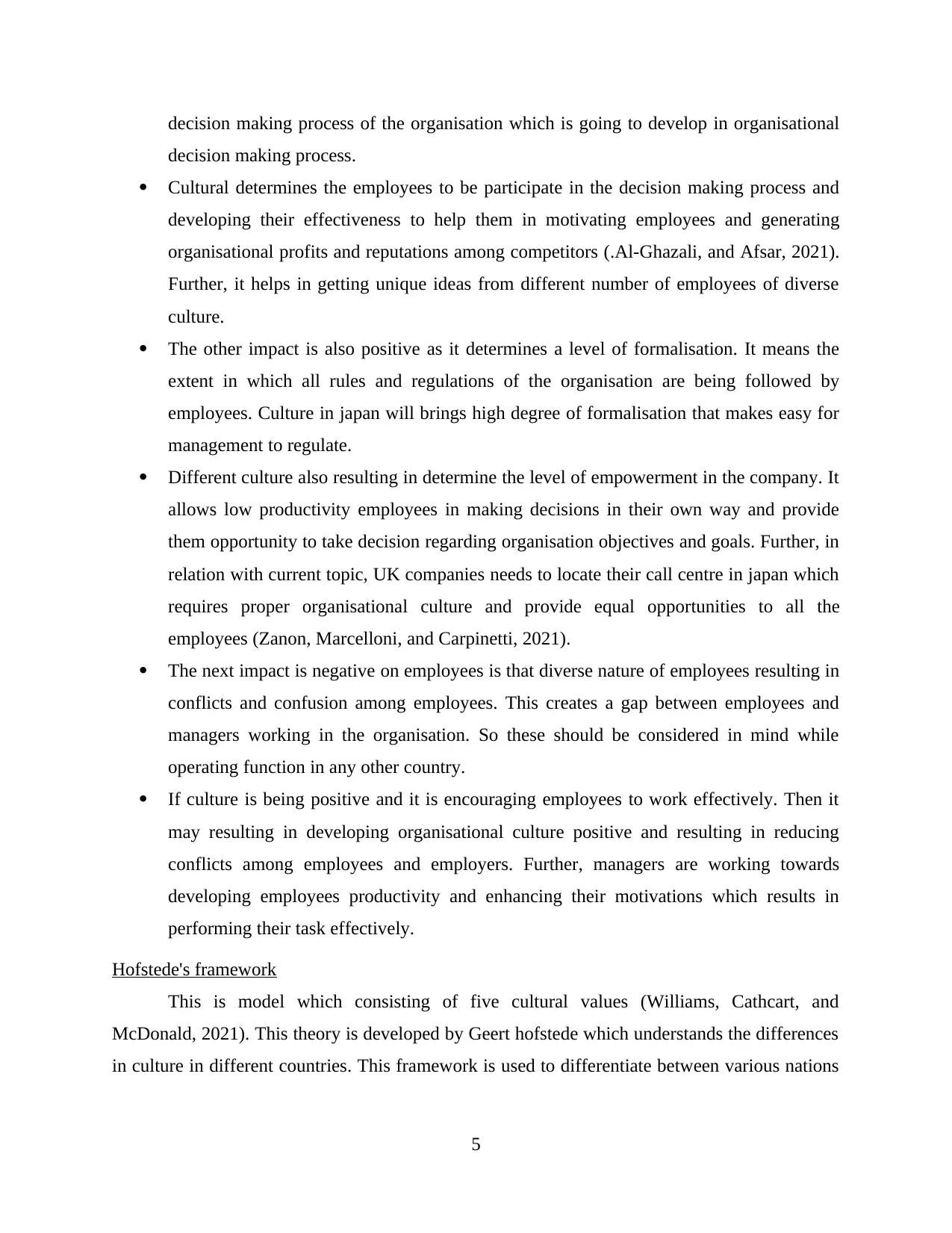
decision making process of the organisation which is going to develop in organisational
decision making process.
Cultural determines the employees to be participate in the decision making process and
developing their effectiveness to help them in motivating employees and generating
organisational profits and reputations among competitors (.Al‐Ghazali, and Afsar, 2021).
Further, it helps in getting unique ideas from different number of employees of diverse
culture.
The other impact is also positive as it determines a level of formalisation. It means the
extent in which all rules and regulations of the organisation are being followed by
employees. Culture in japan will brings high degree of formalisation that makes easy for
management to regulate.
Different culture also resulting in determine the level of empowerment in the company. It
allows low productivity employees in making decisions in their own way and provide
them opportunity to take decision regarding organisation objectives and goals. Further, in
relation with current topic, UK companies needs to locate their call centre in japan which
requires proper organisational culture and provide equal opportunities to all the
employees (Zanon, Marcelloni, and Carpinetti, 2021).
The next impact is negative on employees is that diverse nature of employees resulting in
conflicts and confusion among employees. This creates a gap between employees and
managers working in the organisation. So these should be considered in mind while
operating function in any other country.
If culture is being positive and it is encouraging employees to work effectively. Then it
may resulting in developing organisational culture positive and resulting in reducing
conflicts among employees and employers. Further, managers are working towards
developing employees productivity and enhancing their motivations which results in
performing their task effectively.
Hofstede's framework
This is model which consisting of five cultural values (Williams, Cathcart, and
McDonald, 2021). This theory is developed by Geert hofstede which understands the differences
in culture in different countries. This framework is used to differentiate between various nations
5
decision making process.
Cultural determines the employees to be participate in the decision making process and
developing their effectiveness to help them in motivating employees and generating
organisational profits and reputations among competitors (.Al‐Ghazali, and Afsar, 2021).
Further, it helps in getting unique ideas from different number of employees of diverse
culture.
The other impact is also positive as it determines a level of formalisation. It means the
extent in which all rules and regulations of the organisation are being followed by
employees. Culture in japan will brings high degree of formalisation that makes easy for
management to regulate.
Different culture also resulting in determine the level of empowerment in the company. It
allows low productivity employees in making decisions in their own way and provide
them opportunity to take decision regarding organisation objectives and goals. Further, in
relation with current topic, UK companies needs to locate their call centre in japan which
requires proper organisational culture and provide equal opportunities to all the
employees (Zanon, Marcelloni, and Carpinetti, 2021).
The next impact is negative on employees is that diverse nature of employees resulting in
conflicts and confusion among employees. This creates a gap between employees and
managers working in the organisation. So these should be considered in mind while
operating function in any other country.
If culture is being positive and it is encouraging employees to work effectively. Then it
may resulting in developing organisational culture positive and resulting in reducing
conflicts among employees and employers. Further, managers are working towards
developing employees productivity and enhancing their motivations which results in
performing their task effectively.
Hofstede's framework
This is model which consisting of five cultural values (Williams, Cathcart, and
McDonald, 2021). This theory is developed by Geert hofstede which understands the differences
in culture in different countries. This framework is used to differentiate between various nations
5
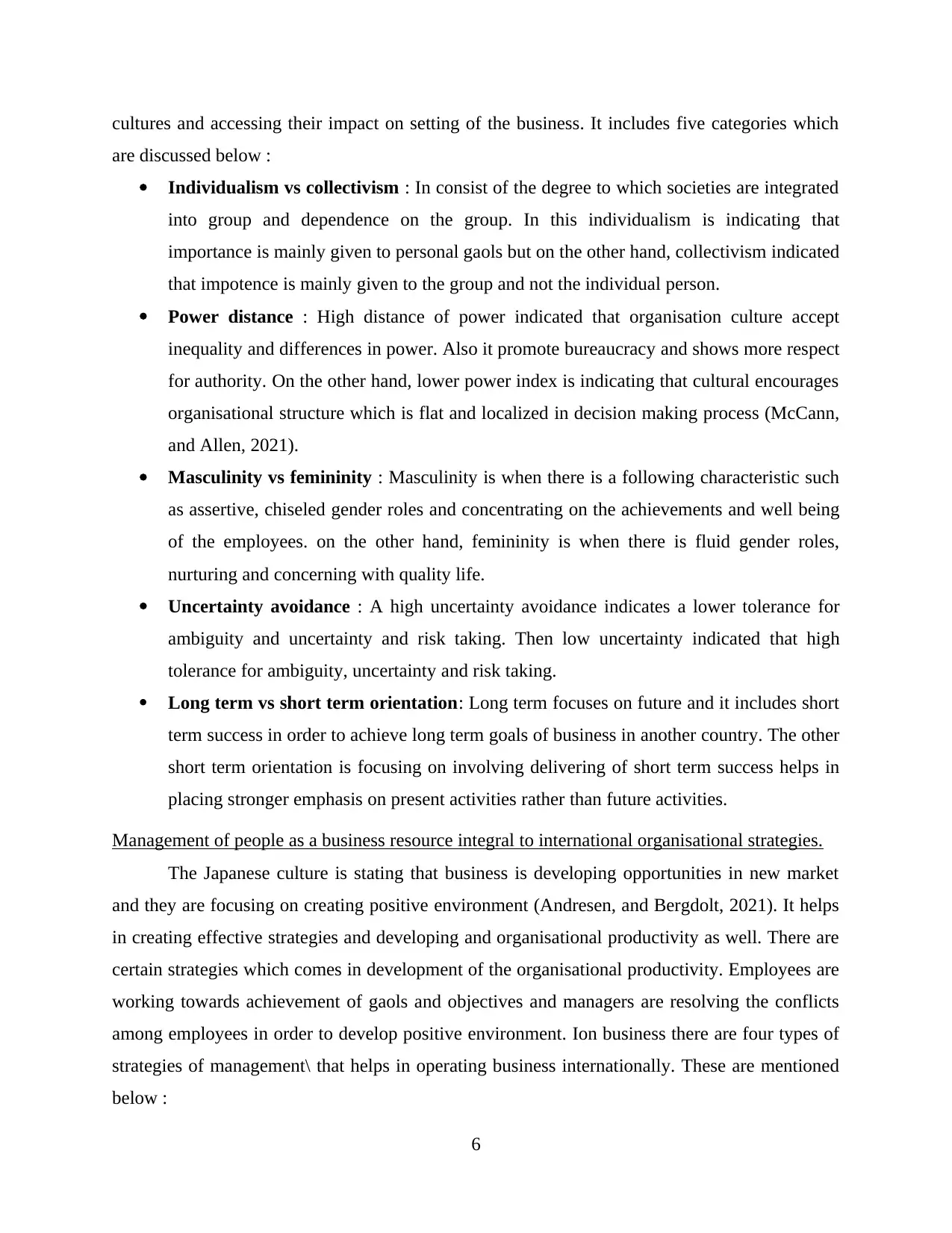
cultures and accessing their impact on setting of the business. It includes five categories which
are discussed below :
Individualism vs collectivism : In consist of the degree to which societies are integrated
into group and dependence on the group. In this individualism is indicating that
importance is mainly given to personal gaols but on the other hand, collectivism indicated
that impotence is mainly given to the group and not the individual person.
Power distance : High distance of power indicated that organisation culture accept
inequality and differences in power. Also it promote bureaucracy and shows more respect
for authority. On the other hand, lower power index is indicating that cultural encourages
organisational structure which is flat and localized in decision making process (McCann,
and Allen, 2021).
Masculinity vs femininity : Masculinity is when there is a following characteristic such
as assertive, chiseled gender roles and concentrating on the achievements and well being
of the employees. on the other hand, femininity is when there is fluid gender roles,
nurturing and concerning with quality life.
Uncertainty avoidance : A high uncertainty avoidance indicates a lower tolerance for
ambiguity and uncertainty and risk taking. Then low uncertainty indicated that high
tolerance for ambiguity, uncertainty and risk taking.
Long term vs short term orientation: Long term focuses on future and it includes short
term success in order to achieve long term goals of business in another country. The other
short term orientation is focusing on involving delivering of short term success helps in
placing stronger emphasis on present activities rather than future activities.
Management of people as a business resource integral to international organisational strategies.
The Japanese culture is stating that business is developing opportunities in new market
and they are focusing on creating positive environment (Andresen, and Bergdolt, 2021). It helps
in creating effective strategies and developing and organisational productivity as well. There are
certain strategies which comes in development of the organisational productivity. Employees are
working towards achievement of gaols and objectives and managers are resolving the conflicts
among employees in order to develop positive environment. Ion business there are four types of
strategies of management\ that helps in operating business internationally. These are mentioned
below :
6
are discussed below :
Individualism vs collectivism : In consist of the degree to which societies are integrated
into group and dependence on the group. In this individualism is indicating that
importance is mainly given to personal gaols but on the other hand, collectivism indicated
that impotence is mainly given to the group and not the individual person.
Power distance : High distance of power indicated that organisation culture accept
inequality and differences in power. Also it promote bureaucracy and shows more respect
for authority. On the other hand, lower power index is indicating that cultural encourages
organisational structure which is flat and localized in decision making process (McCann,
and Allen, 2021).
Masculinity vs femininity : Masculinity is when there is a following characteristic such
as assertive, chiseled gender roles and concentrating on the achievements and well being
of the employees. on the other hand, femininity is when there is fluid gender roles,
nurturing and concerning with quality life.
Uncertainty avoidance : A high uncertainty avoidance indicates a lower tolerance for
ambiguity and uncertainty and risk taking. Then low uncertainty indicated that high
tolerance for ambiguity, uncertainty and risk taking.
Long term vs short term orientation: Long term focuses on future and it includes short
term success in order to achieve long term goals of business in another country. The other
short term orientation is focusing on involving delivering of short term success helps in
placing stronger emphasis on present activities rather than future activities.
Management of people as a business resource integral to international organisational strategies.
The Japanese culture is stating that business is developing opportunities in new market
and they are focusing on creating positive environment (Andresen, and Bergdolt, 2021). It helps
in creating effective strategies and developing and organisational productivity as well. There are
certain strategies which comes in development of the organisational productivity. Employees are
working towards achievement of gaols and objectives and managers are resolving the conflicts
among employees in order to develop positive environment. Ion business there are four types of
strategies of management\ that helps in operating business internationally. These are mentioned
below :
6
⊘ This is a preview!⊘
Do you want full access?
Subscribe today to unlock all pages.

Trusted by 1+ million students worldwide
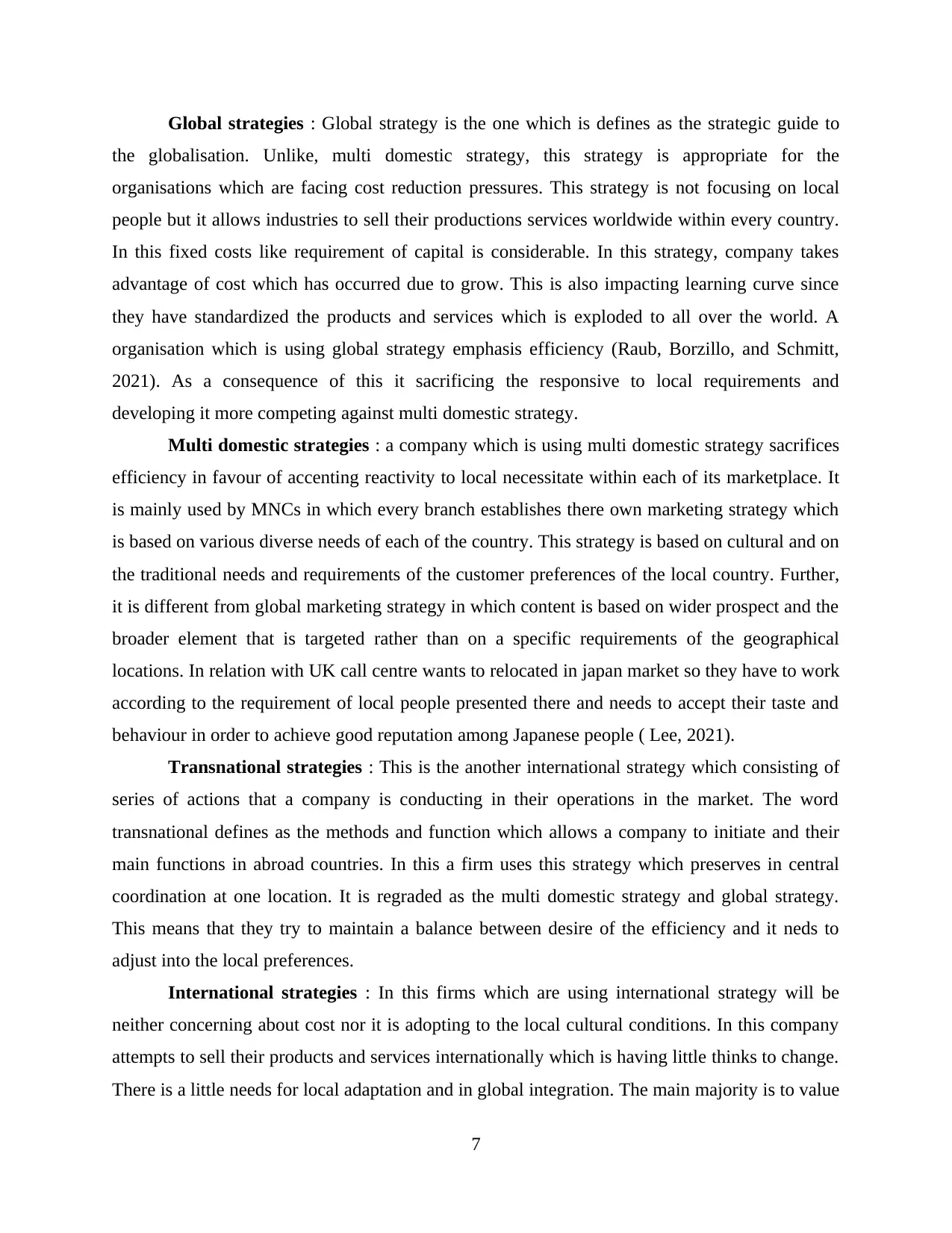
Global strategies : Global strategy is the one which is defines as the strategic guide to
the globalisation. Unlike, multi domestic strategy, this strategy is appropriate for the
organisations which are facing cost reduction pressures. This strategy is not focusing on local
people but it allows industries to sell their productions services worldwide within every country.
In this fixed costs like requirement of capital is considerable. In this strategy, company takes
advantage of cost which has occurred due to grow. This is also impacting learning curve since
they have standardized the products and services which is exploded to all over the world. A
organisation which is using global strategy emphasis efficiency (Raub, Borzillo, and Schmitt,
2021). As a consequence of this it sacrificing the responsive to local requirements and
developing it more competing against multi domestic strategy.
Multi domestic strategies : a company which is using multi domestic strategy sacrifices
efficiency in favour of accenting reactivity to local necessitate within each of its marketplace. It
is mainly used by MNCs in which every branch establishes there own marketing strategy which
is based on various diverse needs of each of the country. This strategy is based on cultural and on
the traditional needs and requirements of the customer preferences of the local country. Further,
it is different from global marketing strategy in which content is based on wider prospect and the
broader element that is targeted rather than on a specific requirements of the geographical
locations. In relation with UK call centre wants to relocated in japan market so they have to work
according to the requirement of local people presented there and needs to accept their taste and
behaviour in order to achieve good reputation among Japanese people ( Lee, 2021).
Transnational strategies : This is the another international strategy which consisting of
series of actions that a company is conducting in their operations in the market. The word
transnational defines as the methods and function which allows a company to initiate and their
main functions in abroad countries. In this a firm uses this strategy which preserves in central
coordination at one location. It is regraded as the multi domestic strategy and global strategy.
This means that they try to maintain a balance between desire of the efficiency and it neds to
adjust into the local preferences.
International strategies : In this firms which are using international strategy will be
neither concerning about cost nor it is adopting to the local cultural conditions. In this company
attempts to sell their products and services internationally which is having little thinks to change.
There is a little needs for local adaptation and in global integration. The main majority is to value
7
the globalisation. Unlike, multi domestic strategy, this strategy is appropriate for the
organisations which are facing cost reduction pressures. This strategy is not focusing on local
people but it allows industries to sell their productions services worldwide within every country.
In this fixed costs like requirement of capital is considerable. In this strategy, company takes
advantage of cost which has occurred due to grow. This is also impacting learning curve since
they have standardized the products and services which is exploded to all over the world. A
organisation which is using global strategy emphasis efficiency (Raub, Borzillo, and Schmitt,
2021). As a consequence of this it sacrificing the responsive to local requirements and
developing it more competing against multi domestic strategy.
Multi domestic strategies : a company which is using multi domestic strategy sacrifices
efficiency in favour of accenting reactivity to local necessitate within each of its marketplace. It
is mainly used by MNCs in which every branch establishes there own marketing strategy which
is based on various diverse needs of each of the country. This strategy is based on cultural and on
the traditional needs and requirements of the customer preferences of the local country. Further,
it is different from global marketing strategy in which content is based on wider prospect and the
broader element that is targeted rather than on a specific requirements of the geographical
locations. In relation with UK call centre wants to relocated in japan market so they have to work
according to the requirement of local people presented there and needs to accept their taste and
behaviour in order to achieve good reputation among Japanese people ( Lee, 2021).
Transnational strategies : This is the another international strategy which consisting of
series of actions that a company is conducting in their operations in the market. The word
transnational defines as the methods and function which allows a company to initiate and their
main functions in abroad countries. In this a firm uses this strategy which preserves in central
coordination at one location. It is regraded as the multi domestic strategy and global strategy.
This means that they try to maintain a balance between desire of the efficiency and it neds to
adjust into the local preferences.
International strategies : In this firms which are using international strategy will be
neither concerning about cost nor it is adopting to the local cultural conditions. In this company
attempts to sell their products and services internationally which is having little thinks to change.
There is a little needs for local adaptation and in global integration. The main majority is to value
7
Paraphrase This Document
Need a fresh take? Get an instant paraphrase of this document with our AI Paraphraser
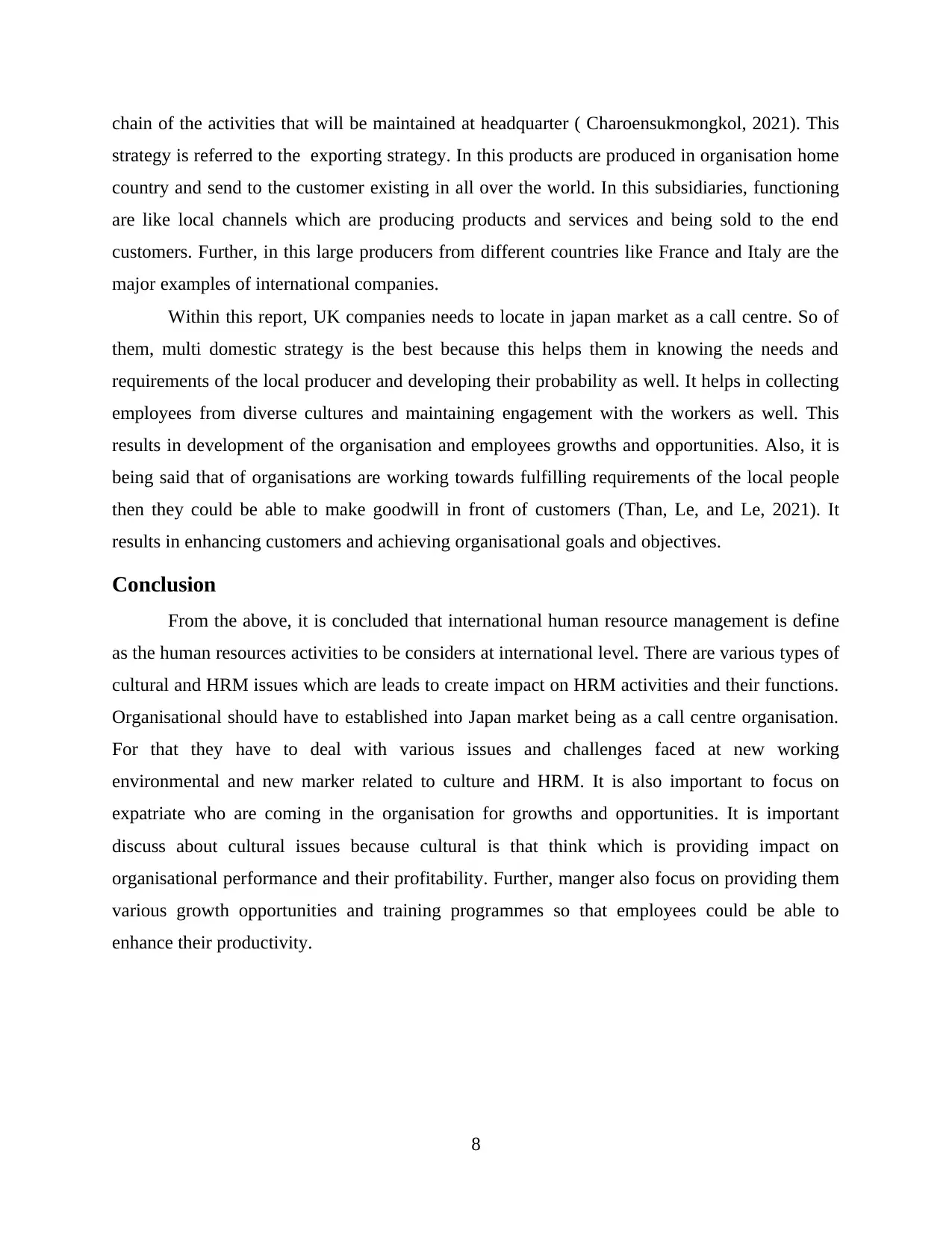
chain of the activities that will be maintained at headquarter ( Charoensukmongkol, 2021). This
strategy is referred to the exporting strategy. In this products are produced in organisation home
country and send to the customer existing in all over the world. In this subsidiaries, functioning
are like local channels which are producing products and services and being sold to the end
customers. Further, in this large producers from different countries like France and Italy are the
major examples of international companies.
Within this report, UK companies needs to locate in japan market as a call centre. So of
them, multi domestic strategy is the best because this helps them in knowing the needs and
requirements of the local producer and developing their probability as well. It helps in collecting
employees from diverse cultures and maintaining engagement with the workers as well. This
results in development of the organisation and employees growths and opportunities. Also, it is
being said that of organisations are working towards fulfilling requirements of the local people
then they could be able to make goodwill in front of customers (Than, Le, and Le, 2021). It
results in enhancing customers and achieving organisational goals and objectives.
Conclusion
From the above, it is concluded that international human resource management is define
as the human resources activities to be considers at international level. There are various types of
cultural and HRM issues which are leads to create impact on HRM activities and their functions.
Organisational should have to established into Japan market being as a call centre organisation.
For that they have to deal with various issues and challenges faced at new working
environmental and new marker related to culture and HRM. It is also important to focus on
expatriate who are coming in the organisation for growths and opportunities. It is important
discuss about cultural issues because cultural is that think which is providing impact on
organisational performance and their profitability. Further, manger also focus on providing them
various growth opportunities and training programmes so that employees could be able to
enhance their productivity.
8
strategy is referred to the exporting strategy. In this products are produced in organisation home
country and send to the customer existing in all over the world. In this subsidiaries, functioning
are like local channels which are producing products and services and being sold to the end
customers. Further, in this large producers from different countries like France and Italy are the
major examples of international companies.
Within this report, UK companies needs to locate in japan market as a call centre. So of
them, multi domestic strategy is the best because this helps them in knowing the needs and
requirements of the local producer and developing their probability as well. It helps in collecting
employees from diverse cultures and maintaining engagement with the workers as well. This
results in development of the organisation and employees growths and opportunities. Also, it is
being said that of organisations are working towards fulfilling requirements of the local people
then they could be able to make goodwill in front of customers (Than, Le, and Le, 2021). It
results in enhancing customers and achieving organisational goals and objectives.
Conclusion
From the above, it is concluded that international human resource management is define
as the human resources activities to be considers at international level. There are various types of
cultural and HRM issues which are leads to create impact on HRM activities and their functions.
Organisational should have to established into Japan market being as a call centre organisation.
For that they have to deal with various issues and challenges faced at new working
environmental and new marker related to culture and HRM. It is also important to focus on
expatriate who are coming in the organisation for growths and opportunities. It is important
discuss about cultural issues because cultural is that think which is providing impact on
organisational performance and their profitability. Further, manger also focus on providing them
various growth opportunities and training programmes so that employees could be able to
enhance their productivity.
8
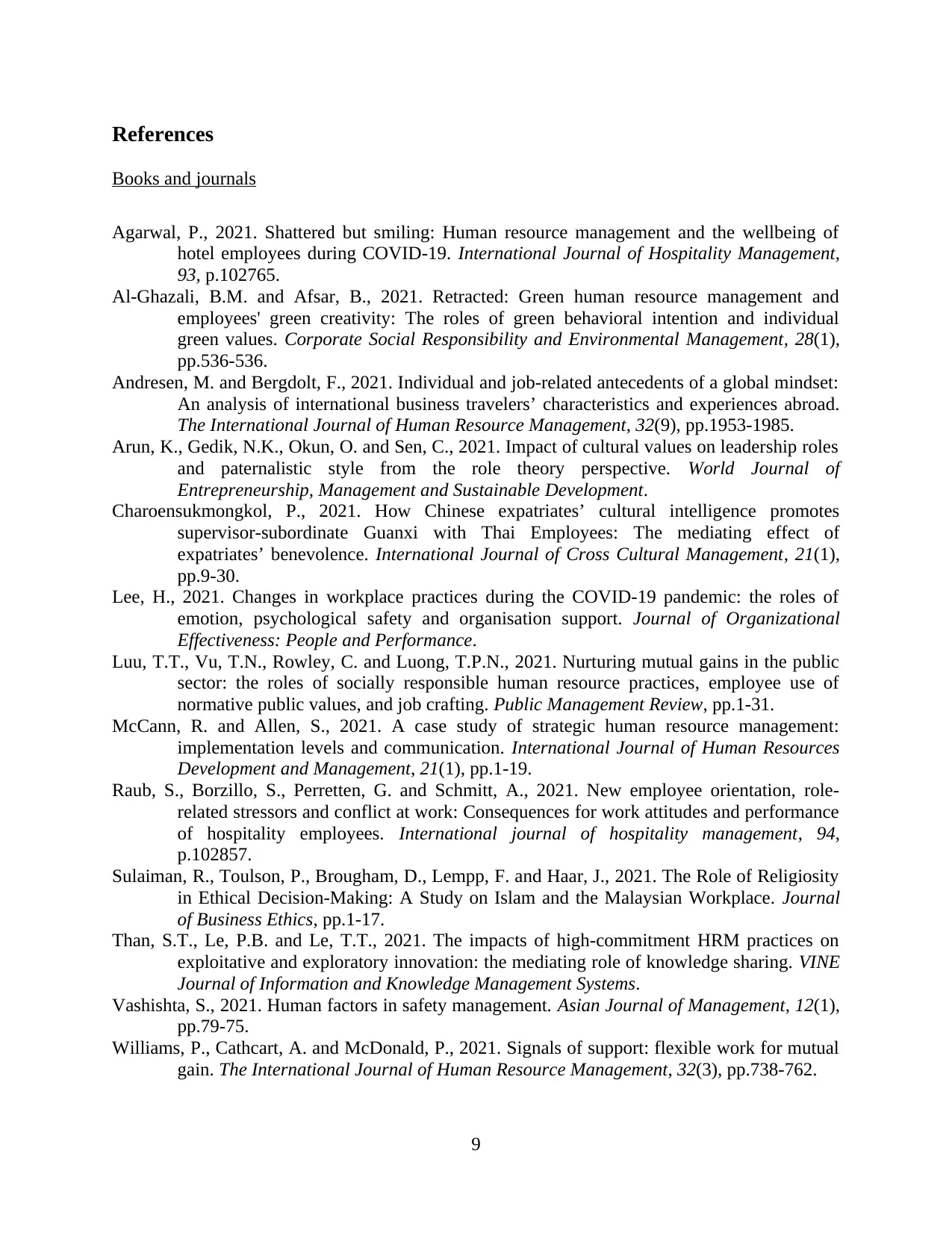
References
Books and journals
Agarwal, P., 2021. Shattered but smiling: Human resource management and the wellbeing of
hotel employees during COVID-19. International Journal of Hospitality Management,
93, p.102765.
Al‐Ghazali, B.M. and Afsar, B., 2021. Retracted: Green human resource management and
employees' green creativity: The roles of green behavioral intention and individual
green values. Corporate Social Responsibility and Environmental Management, 28(1),
pp.536-536.
Andresen, M. and Bergdolt, F., 2021. Individual and job-related antecedents of a global mindset:
An analysis of international business travelers’ characteristics and experiences abroad.
The International Journal of Human Resource Management, 32(9), pp.1953-1985.
Arun, K., Gedik, N.K., Okun, O. and Sen, C., 2021. Impact of cultural values on leadership roles
and paternalistic style from the role theory perspective. World Journal of
Entrepreneurship, Management and Sustainable Development.
Charoensukmongkol, P., 2021. How Chinese expatriates’ cultural intelligence promotes
supervisor-subordinate Guanxi with Thai Employees: The mediating effect of
expatriates’ benevolence. International Journal of Cross Cultural Management, 21(1),
pp.9-30.
Lee, H., 2021. Changes in workplace practices during the COVID-19 pandemic: the roles of
emotion, psychological safety and organisation support. Journal of Organizational
Effectiveness: People and Performance.
Luu, T.T., Vu, T.N., Rowley, C. and Luong, T.P.N., 2021. Nurturing mutual gains in the public
sector: the roles of socially responsible human resource practices, employee use of
normative public values, and job crafting. Public Management Review, pp.1-31.
McCann, R. and Allen, S., 2021. A case study of strategic human resource management:
implementation levels and communication. International Journal of Human Resources
Development and Management, 21(1), pp.1-19.
Raub, S., Borzillo, S., Perretten, G. and Schmitt, A., 2021. New employee orientation, role-
related stressors and conflict at work: Consequences for work attitudes and performance
of hospitality employees. International journal of hospitality management, 94,
p.102857.
Sulaiman, R., Toulson, P., Brougham, D., Lempp, F. and Haar, J., 2021. The Role of Religiosity
in Ethical Decision-Making: A Study on Islam and the Malaysian Workplace. Journal
of Business Ethics, pp.1-17.
Than, S.T., Le, P.B. and Le, T.T., 2021. The impacts of high-commitment HRM practices on
exploitative and exploratory innovation: the mediating role of knowledge sharing. VINE
Journal of Information and Knowledge Management Systems.
Vashishta, S., 2021. Human factors in safety management. Asian Journal of Management, 12(1),
pp.79-75.
Williams, P., Cathcart, A. and McDonald, P., 2021. Signals of support: flexible work for mutual
gain. The International Journal of Human Resource Management, 32(3), pp.738-762.
9
Books and journals
Agarwal, P., 2021. Shattered but smiling: Human resource management and the wellbeing of
hotel employees during COVID-19. International Journal of Hospitality Management,
93, p.102765.
Al‐Ghazali, B.M. and Afsar, B., 2021. Retracted: Green human resource management and
employees' green creativity: The roles of green behavioral intention and individual
green values. Corporate Social Responsibility and Environmental Management, 28(1),
pp.536-536.
Andresen, M. and Bergdolt, F., 2021. Individual and job-related antecedents of a global mindset:
An analysis of international business travelers’ characteristics and experiences abroad.
The International Journal of Human Resource Management, 32(9), pp.1953-1985.
Arun, K., Gedik, N.K., Okun, O. and Sen, C., 2021. Impact of cultural values on leadership roles
and paternalistic style from the role theory perspective. World Journal of
Entrepreneurship, Management and Sustainable Development.
Charoensukmongkol, P., 2021. How Chinese expatriates’ cultural intelligence promotes
supervisor-subordinate Guanxi with Thai Employees: The mediating effect of
expatriates’ benevolence. International Journal of Cross Cultural Management, 21(1),
pp.9-30.
Lee, H., 2021. Changes in workplace practices during the COVID-19 pandemic: the roles of
emotion, psychological safety and organisation support. Journal of Organizational
Effectiveness: People and Performance.
Luu, T.T., Vu, T.N., Rowley, C. and Luong, T.P.N., 2021. Nurturing mutual gains in the public
sector: the roles of socially responsible human resource practices, employee use of
normative public values, and job crafting. Public Management Review, pp.1-31.
McCann, R. and Allen, S., 2021. A case study of strategic human resource management:
implementation levels and communication. International Journal of Human Resources
Development and Management, 21(1), pp.1-19.
Raub, S., Borzillo, S., Perretten, G. and Schmitt, A., 2021. New employee orientation, role-
related stressors and conflict at work: Consequences for work attitudes and performance
of hospitality employees. International journal of hospitality management, 94,
p.102857.
Sulaiman, R., Toulson, P., Brougham, D., Lempp, F. and Haar, J., 2021. The Role of Religiosity
in Ethical Decision-Making: A Study on Islam and the Malaysian Workplace. Journal
of Business Ethics, pp.1-17.
Than, S.T., Le, P.B. and Le, T.T., 2021. The impacts of high-commitment HRM practices on
exploitative and exploratory innovation: the mediating role of knowledge sharing. VINE
Journal of Information and Knowledge Management Systems.
Vashishta, S., 2021. Human factors in safety management. Asian Journal of Management, 12(1),
pp.79-75.
Williams, P., Cathcart, A. and McDonald, P., 2021. Signals of support: flexible work for mutual
gain. The International Journal of Human Resource Management, 32(3), pp.738-762.
9
⊘ This is a preview!⊘
Do you want full access?
Subscribe today to unlock all pages.

Trusted by 1+ million students worldwide
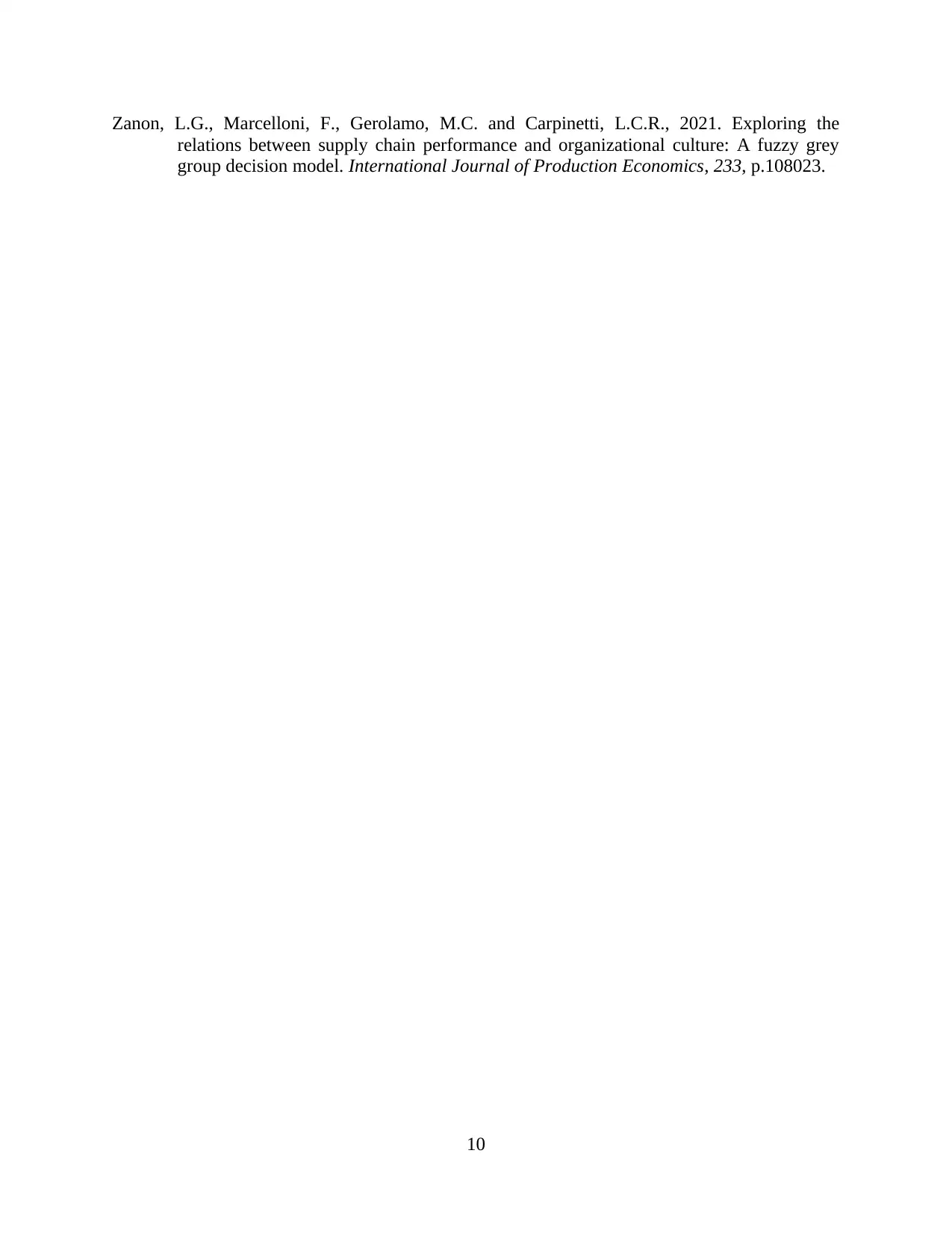
Zanon, L.G., Marcelloni, F., Gerolamo, M.C. and Carpinetti, L.C.R., 2021. Exploring the
relations between supply chain performance and organizational culture: A fuzzy grey
group decision model. International Journal of Production Economics, 233, p.108023.
10
relations between supply chain performance and organizational culture: A fuzzy grey
group decision model. International Journal of Production Economics, 233, p.108023.
10
1 out of 10
Related Documents
Your All-in-One AI-Powered Toolkit for Academic Success.
+13062052269
info@desklib.com
Available 24*7 on WhatsApp / Email
![[object Object]](/_next/static/media/star-bottom.7253800d.svg)
Unlock your academic potential
Copyright © 2020–2026 A2Z Services. All Rights Reserved. Developed and managed by ZUCOL.





